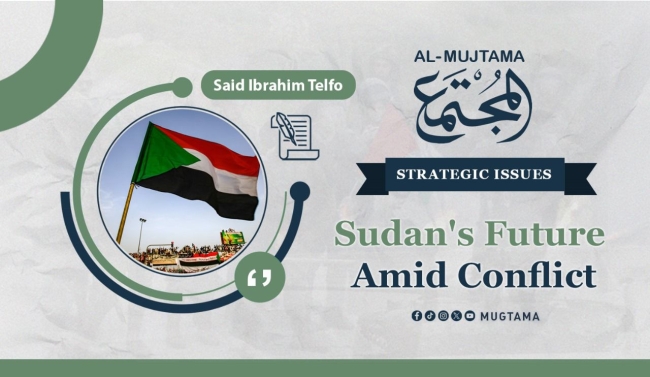Looking towards the future requires breaking free from narrow frameworks and thinking with broader perspectives. This approach leads to inevitable solutions, as there is no perpetual conflict or static conditions; such is the nature of life. Viewing the Sudanese conflict from a comprehensive perspective reveals its causes and objectives. Understanding the causes helps us grasp the magnitude of the conflict, and through identifying the conflict's objectives, we can find solutions. Nothing is impossible unless the Sudanese people succumb to the goals of those behind the conflict, becoming easy victims for the sake of fulfilling the interests of conflict agents.
We need a magnifier through which we can clearly see the issue of the conflict in Sudan. By magnifying the scene, we see a well-orchestrated plan for managing the conflict. When we trace its paths, timelines, and outcomes, the true agents emerge—those implementing this plan without justification other than their connection to Zionism and the New World Order, which serves as a substitute for old colonialism. This system hides behind humanitarian, educational, and economic institutions and programs, united by a pragmatic interest seeking to exploit the resources of victim countries and prevent their people from growing and developing.
Therefore, our Sudan is not an exception, as its land is rich in valuable resources like gold and other minerals that have led the West and its agents to pursue their interests in Sudan. Unfortunately, some of these agents are of our own kind, left by colonialism as a legacy we have faced since independence. This legacy contributes to implementing a unified plan among foreign interest holders, whether colonialists or Zionist Jews, who dream of dominating the region from the Nile to the Euphrates.
Thus, the conflict in Sudan will persist as long as the colonial plan stands. The unaware people of these plans will always be easy victims, as beneficiaries of the conflict include agents from several countries, including logistics, espionage, killing, and displacement agents. This makes Sudan an easy target for them. The conflict has rendered the Sudanese people unable to distinguish truth, exacerbated by modern media smear campaigns supported by advanced technologies.
Between what is happening and what we strive for as free Sudanese, we see that the only solution in this dark scene is a continuous struggle to liberate Sudan from mercenaries. Negotiating with the colonizers is complex and may not be accepted by reason. Someday, the Sudanese people will understand the reasons behind this complex scene and realize the solutions themselves. Bringing solutions imposed by dialogue may bring “Rapid Support Forces” and “Taqaddum” to power, which will create another conflict. The collective awareness of the Sudanese people recognizes the connection of these militias with “Taqaddum” and the foreign interests supporting them, making it essential for the people to see the need to remove this colonial facade.
We reaffirm our desire as Sudanese for the effective solution to come from within Sudan, from among its free people. They must sit together and agree on internal solutions. We have an example in Africa, the land of conflicts: Rwanda, where unprecedented violations occurred but internal peace was eventually achieved. This could be a model to emulate. Additionally, there must be a focus on building strong and independent institutions capable of addressing internal and external challenges.
The Sudanese must rally around a unifying national identity that allows them to overcome ethnic, religious, and political divisions. This can be achieved through awareness campaigns aimed at promoting unity and national belonging. Furthermore, efforts should focus on enhancing dialogue among various components of Sudanese society to achieve mutual understanding and build trust.
To achieve peace and stability, the role of youth in the process of change cannot be ignored. Sudanese youth must be empowered to actively participate in political and social life, providing them with opportunities to contribute to building the future of their country. This can be achieved by launching training and qualification programs aimed at developing youth skills and empowering them to lead the process of change.
Education is the cornerstone of achieving sustainable development, where the focus must be on improving the quality of education and providing educational opportunities for everyone, including children in rural and remote areas. It is also crucial to develop curricula that include national values and life skills that help individuals achieve positive change in their communities.
The future of Sudan heavily depends on its people's ability to collaborate and cooperate towards achieving peace, stability, and development. This should be done by understanding the root causes of conflicts and working on innovative and sustainable solutions. Sudan can serve as a model for overcoming conflicts and achieving sustainable development if there is a focus on internal solutions, national unity, and enhancing the role of youth and education.
Despite the importance of internal solutions, the role of the international community in supporting peace and development efforts in Sudan cannot be ignored. The international community should provide necessary support to Sudan in humanitarian relief, reconstruction, promoting good governance, and building democratic institutions.
-------------------------------------------------------------


